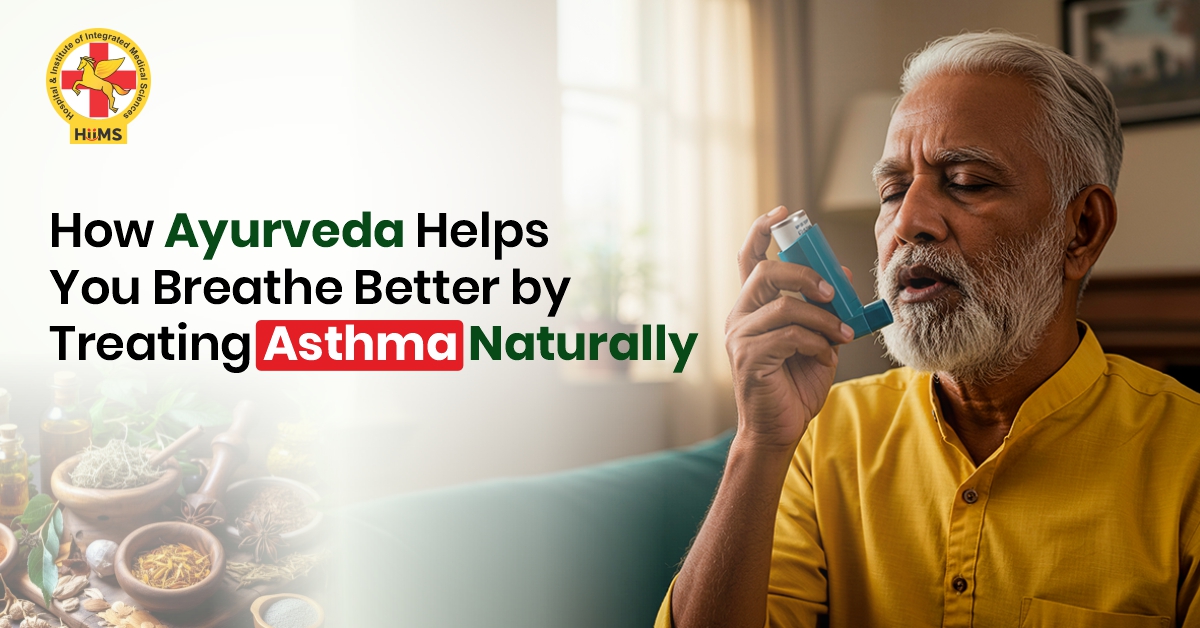Breathing, a habit you can say is so simple that we rarely notice it, but it becomes a struggle for those living with asthma. Each breath feels like a task; the chest tightens, a wheeze follows, and you’re left gasping even after climbing a few stairs. Many people depend on inhalers or modern medicines that bring short-term relief, but deep inside, there’s always a wish, a wish for something natural, something that actually heals. Not just for temporary relief.
That’s where Ayurvedic treatment for asthma helps. Ayurveda doesn’t chase behind only the symptoms; it rebuilds the inner balance that helps your lungs work the way nature intended. It combines the wisdom of herbs, therapies, and lifestyle to correct what’s gone wrong inside. At Jeena Sikho HiiMS Safdarjung, this time-tested system is used to bring complete healing, not just to the lungs, but to your entire body and mind.
In this blog, you’ll understand what asthma really is, how Ayurveda describes it, and how natural therapies, herbs, and diet can help you breathe freely again.
Understanding Asthma: A Modern & Ayurvedic View
What is Asthma?
Asthma affects the lungs by tightening and irritating the airways, which makes every breath feel like an effort. It typically causes wheezing, coughing, chest tightness, and shortness of breath. Common reasons are allergens, cold air, dust, pollution, or even emotional stress. When these triggers appear, airways swell, and mucus builds up, leaving you struggling to take in air.
How Ayurveda Sees It (Tamaka Svasa)
In Ayurveda, asthma is called Tamaka Svasa, a condition caused by an imbalance between Vata and Kapha. When Kapha blocks the channels that carry air (known as pranavaha srotas), and Vata moves irregularly, it results in breathlessness. Ayurveda believes that weak digestion, toxin buildup (ama), and disturbed doshas together create this problem.
The focus isn’t just on managing wheezing or cough but on restoring inner balance, clearing toxins, strengthening digestion, and calming the respiratory pathways.
Causes, Triggers & Symptoms from an Ayurvedic Perspective
Key Triggers & Underlying Causes
According to Ayurveda, poor digestion (mandagni) leads to ama buildup, the sticky toxins that block your breathing channels. Eating cold, oily, or heavy foods, irregular sleep, and exposure to dust or cold air make it worse. Stress, too, plays a silent role in disturbing Vata and Kapha.
When Kapha gets thick and blocks the chest, Vata moves the wrong way (pratiloma gati), causing difficulty in exhaling; that’s the shortness of breath people feel during an asthma attack.
Symptoms & Dosha Patterns
If Vata dominates, there’s a dry cough and restless sleep.
If Kapha dominates, heaviness, phlegm, and sluggishness appear.
If Pitta joins in, there’s burning and irritation in the chest.
Understanding your dosha pattern helps the doctor figure out the natural treatment for asthma that suits you best.
The Ayurvedic Approach to Treatment: Natural Treatment for Asthma
Two Key Pillars: Shodhana & Shamana
Ayurveda treats asthma in two main ways. Shodhana focuses on cleansing the body through procedures like Vamana (therapeutic vomiting) and Virechana (purgation), which helps clear excess Kapha and toxins. Also, there are other specific therapies for Asthma like Dhumpan therapy, etc.
Then comes Shamana, which uses herbs, diet, and therapies to calm the doshas, strengthen the lungs, and prevent recurrence. This combined process makes Ayurvedic treatment for asthma a long-term healing approach rather than a temporary fix.
Herbal Remedies for Asthma (Natural Asthma Relief with Ayurvedic Herbs)
Ayurvedic herbs work like quiet healers for the lungs. Commonly used ones include Vasa to ease coughing, Yashtimadhu (Licorice root) to soothe airways, and Mulethi for inflammation. Ginger, black pepper, turmeric, and choti elaichi help clear mucus and improve lung function.
These herbal remedies for asthma, when prescribed by the best Ayurvedic doctor for asthma treatment at Jeena Sikho HiiMS Safdarjung, bring natural asthma relief with Ayurvedic herbs and improve breathing comfort steadily.
Diet & Lifestyle (Natural Ways to Control Asthma)
Food and daily habits are as important as medicine. Ayurveda suggests staying away from cold, heavy, and processed foods like curd, cheese, and deep-fried snacks.
Instead, include warm, light, and easily digestible meals, soups, khichdi, and herbal teas made with ginger or turmeric. Drink lukewarm water and avoid sleeping immediately after eating; you can do vajrasana in between.
Small lifestyle habits help too:
- Avoid dust, smoke, and polluted areas.
- Follow a steady routine with proper rest.
- Practice daily breathing exercises.
These steps form the foundation of natural ways to control asthma and gradually strengthen your lungs.
Breathing & Yoga Practices (How Ayurveda Helps in Asthma Treatment Naturally)
Simple yoga postures and breathing exercises can work wonders. Anulom Vilom, Bhramari Pranayama, and Nadi Shodhana calm the nerves and expand the lungs. Simple asanas like Bhujangasana or Matsyasana open the chest and reduce tightness.
This is how Ayurveda helps in asthma treatment naturally, by connecting breath, body, and mind in one rhythm.
Why Choose Ayurveda for Asthma?
Ayurveda focuses on the root cause, not just the breathing trouble, the symptoms. It combines herbs, therapies, diet, and yogic breathing to balance the system with almost no side effects.
The approach is highly personal, what suits one person might differ for another, and that’s where Ayurveda stands apart. It provides healing that lasts, helping people reduce dependency on inhalers over time while supporting overall vitality.
Role of an Expert Ayurvedic Doctor for Asthma Treatment
The guidance of the best Ayurvedic doctor for asthma treatment is crucial. Every patient’s dosha pattern and symptoms differ, so treatments and herbs must be selected carefully.
At Jeena Sikho HiiMS Safdarjung, doctors assess your digestion, doshas, and lifestyle before starting therapy. Under expert care, patients safely experience natural asthma relief with Ayurvedic herbs and gradual improvement in their breathing.
Conclusion
Breathing freely again is not a dream. Through the Ayurvedic treatment for asthma, with its cleansing therapies, herbs, and mindful habits, the body learns to restore balance and strength naturally. Ayurveda doesn’t fight against the body; it works with it and that’s where real healing begins.
If you or someone you know wants to explore holistic care for asthma, reach out to Jeena Sikho HiiMS Safdarjung, where nature, guidance, and science meet. For appointments or any enquiries, please call +91 93136-66680 or email care@jeenasikho.com.
Author – Dr. Ravinder Kaur (BAMS) is a senior Ayurvedic doctor with over 16 years of experience in holistic healing. She has guided countless patients toward better health using personalized herbal therapies, balanced diet planning, and natural lifestyle correction.
FAQs
1. What makes Ayurvedic treatment for asthma unique?
A: It focuses on clearing toxins, balancing doshas, and strengthening the lungs for sustainable relief.
2. Which herbs help in asthma according to Ayurveda?
A: Vasa, Mulethi, Choti Elaichi and Yashtimadhu are common herbal remedies for asthma that support easy breathing.
3. Can yoga really help in asthma management?
A: Regular pranayama and asanas open chest channels and show how Ayurveda helps in asthma treatment naturally.
4. How does diet influence asthma recovery?
A: A warm, light diet and avoiding Kapha-triggering foods are vital natural ways to control asthma effectively.
5. Why consult an Ayurvedic specialist?
A: The best Ayurvedic doctor for asthma treatment can identify your dosha imbalance and guide you with the right herbs and therapies.


